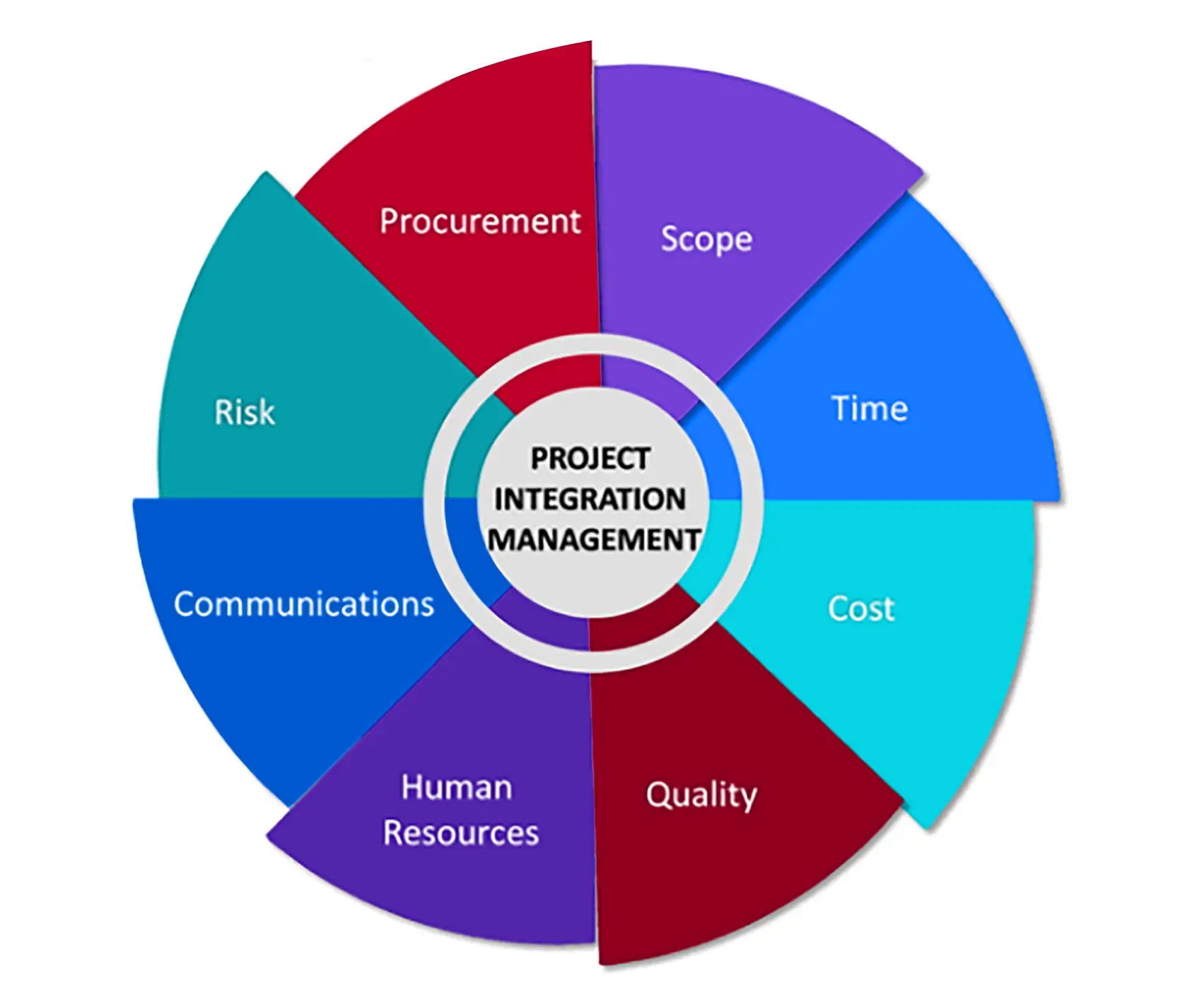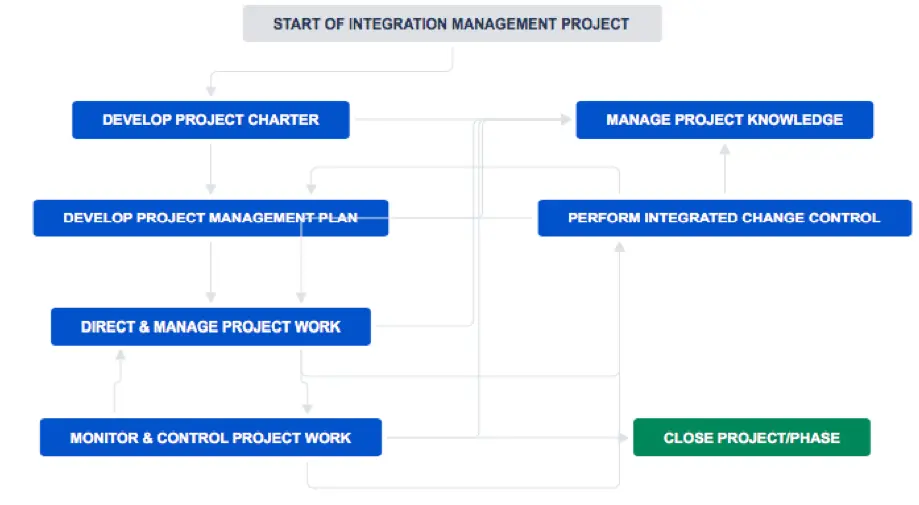
:
Project Integration Management is one of the most important aspects of project management. Different organizations adopt different methodologies of project management according to the complexity of the project, and convenience.
Within the same organization, different teams or different departments might work on different methodologies. There are many processes involved to achieve the targeted goal and successful completion of the project. Project integration management ensures to connect all the dots of processes in a structured manner irrespective of the variation in methodologies to successfully complete the project.
Project Integration Management involves a collaborative system between all the elements of project management such as,

Integrated project management refers to the interconnected and collaborative approach to executing the project with effective coordination.
Project integration management is one of the 10 knowledge areas of project management. This knowledge area runs throughout the 5 phases of project management.
- Initiating
- Planning
- Executing
- Monitoring and controlling
- Closing
The main objective of project management is the coordination within all the stakeholders of the project to ensure the team is working in the right direction to reach the same goal.
The importance of project integration management listed below:
1. Provides coordination and synchronization throughout the project lifecycle
The collaborative approach between all stakeholders to ensure the ease flow of project processes throughout the project.
During the transition phase of project processes, project integration plays a vital role in transferring all the inputs required for the next phase of the project.
Integration management is necessary to ensure there is teamwork and all information is synchronized.
2. Ensures the project run smoothly
With proper integration management, the project activities are completed without any confusion. After finishing all the tasks it can be officially closed and resources can be utilized for the next project.
Due to proper coordination and synchronization projects can run smoothly.
3. Clear understanding of their roles and responsibilities
With structured integration management, all the stakeholders will be clear about their roles and responsibilities. The planning and coordination between the stakeholders are monitored by the project manager.
4. Measures and monitors the project’s progress
Integration management ensures the project’s progress information is distributed to all the stakeholders for clear information about the phases and transitions. The necessary steps are taken to bring the firm decisions to meet the objective.
5. Decisions are made more clear
The decisions about the key changes required for the smooth project flow is taken by conducting meetings with all the stakeholders. The structured coordination between the stakeholders makes the decisions clearer.
6. Manages and controls the performance
Project integration management manages and controls the team’s or individual performance, or delay due to the input from other teams or departments.
7. Ensures due dates, result, project lifecycle, and the benefits management plan are aligned
With proper coordination, the project deliverables are delivered on time according to the plan.
What are the processes involved in Project Integration Management?
There are seven project processes involved in project integration management that runs throughout the project life-cycle in all the phases. The coordination between the resources, stakeholders, and other project elements that ensure to execute the project end to end successfully is Project Integration Management. It is very important because project success highly depends on integration management in terms of schedule, cost, quality, scope, risks, etc. The seven processes are:
1. Develop Project Charter process :
The develop project charter process is a document that is prepared in the initiation phase to formally authorize the existence of the project. In this process, the document is prepared and given to the authoritative project manager to use the resources required for the project.
The project charter is a key element that describes the whole project in brief. The project charter generally includes the objective of the project, stakeholders, requirements, high-level assumptions and constraints, etc.
2. Develop Project Management Plan process:
The process of combining all the project plans and sub-plans into a single integrated plan. It is one of the most crucial processes of project management. Project success is dependent on the project management plan. The authoritative head to plan project management is the project manager.
This document is approved and signed by authorized stakeholders.
3. Direct and Manage Project Work process
In this process, the project work activities are directed and managed while executing. This refers to the term “leading and controlling” the assigned project activities. The key outputs of this process are final deliverables and change requests for the project work.
4. Manage Project Knowledge process
The main objective of this process is to improve the project process using existing knowledge and creating new knowledge. The knowledge created is used for further processes and future projects. The continuing knowledge gain and utilizing the existing knowledge is the main objective of the project.
5. Monitor and Control Project Work process
Monitoring and controlling project work refers to continuous tracking, reviewing and reporting the project progress status to achieve the required target of the project work activities.
The performances of each assigned resource are monitored and controlled. The document is prepared regarding the issue and the improvement possible.
6. Perform Integrated Change Control process
The perform integrated change control process includes reviewing all the change requests and managing them effectively from all the working departments. The document is prepared for approval of any change requests.
The change requests are approved when there is not much impact on scope, time and cost of the project. The change requests can be project deliverables, project plan or project assets.
7. Close Project or Phase process
This process refers to closing the project activities by finalizing all the deliverables of project activities and the documents related to closing the project or phase is prepared by the project manager. In this process, the resources are released to work for other projects.
What are the emerging practices in Project Integration Management?
Project integration management is the combination or consolidation of the results of all the processes of remaining knowledge areas. The following are the emerging practices in Project Integration Management:
1. Project Management Information System(PMIS)
The information project managers want to integrate is collected, analyzed and used in order to meet the objective of the project. This is done by using the Project Management Information System(PMIS) or any other automated tool. PMIS is a software application used to collect information.
2. Using Visual Tools
Visual tools are used to understand critical project elements rather than a written document. By making the project element visible gives a clear picture of the project status to all the team members. This further facilitates knowledge transfer and helps in solving the issues more effectively.
3. Project Knowledge Management
Project Knowledge Management enables continuous learning and knowledge transfer by bringing together stakeholders, procedures, tools, and knowledge required during the project life cycle. It ensures to optimize the knowledge gained by all the team members.
4. Expanding responsibilities
The responsibilities of the project managers are expanded by calling them to initiate and finalize the business case development and business benefits management. Project managers are also responsible for the identification and engagement of stakeholders. The frequent meetings with all the stakeholders due to expanded responsibilities result in better integration management.
5. Hybrid Methodologies
The different methodologies such as agile , business analysis techniques, tools to identify complex elements are combined and used as a part of the emerging practice of project integration management.
Do visit our Corporate Training to know more about core offerings for enterprises in empowering their workforce.
Download Free PMP® Exam Practice Test with 200 PMP® Questions.
Full-length PMP sample test with 200 PMP exam prep questions.
You may also be interested in Sample PMP® Exam Prep Questions before you download the Free PMP® Practice Test.
Download our Free PMP Brochure for more information.
iCert Global conducts Project Management, Quality Management, Business Analysis, Agile, Scrum, and DevOps Certification courses across various locations in the United States.
Visit us at https://www.icertglobal.com/ for more information about our professional certification training courses or Call Now! on +1-713-287-1213 / +1-713-287-1214 or e-mail us at info {at} icertglobal {dot} com.
Project Management Training by iCert Global:
Quality Management Training by iCert Global:
- Lean Six Sigma Yellow Belt (LSSYB) Certification Training Courses
- Lean Six Sigma Green Belt (LSSGB) Certification Training Courses
- Lean Six Sigma Black Belt (LSSBB) Certification Training Courses
Scrum Training by iCert Global:
- CSM (Certified ScrumMaster) Certification Training Courses
Agile Training by iCert Global:
- PMI-ACP (Agile Certified Professional) Certification Training Courses
DevOps Training by iCert Global:
- DevOps Certification Training Courses
Business Analysis Training by iCert Global:
- ECBA (Entry Certificate in Business Analysis) Certification Training Courses
- CCBA (Certificate of Capability in Business Analysis) Certification Training Courses
- CBAP (Certified Business Analysis Professional) Certification Training Courses
The company conducts both Instructor-led Classroom training workshops and Instructor-led Live Online Training sessions for learners from across the United States and around the world.
Please Contact Us for more information about our professional certification training courses to accelerate your career in the new year. Wish you all the best for your learning initiatives in the new year.
Which certifications are you aiming to achieve in the New Year? Let us know your thoughts in the 'Comments' section below. Thank you.
Comments (0)
Write a Comment
Your email address will not be published. Required fields are marked (*)



















.webp)






.webp)
